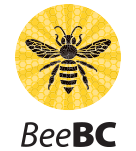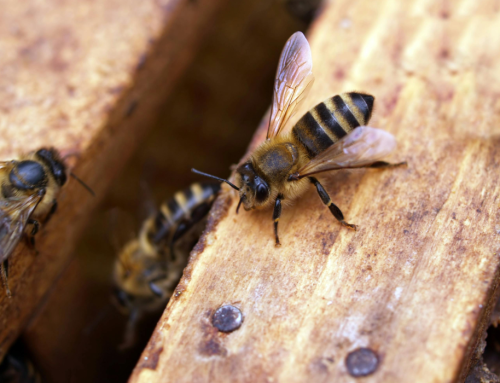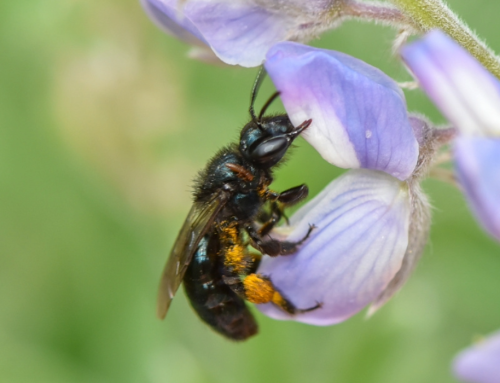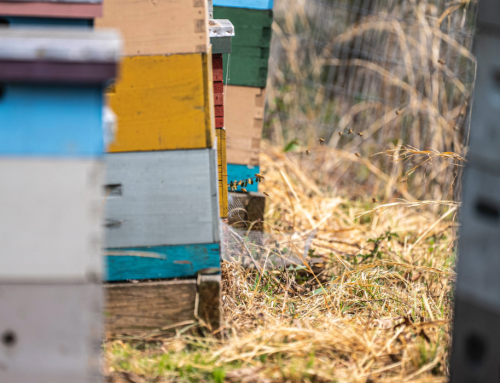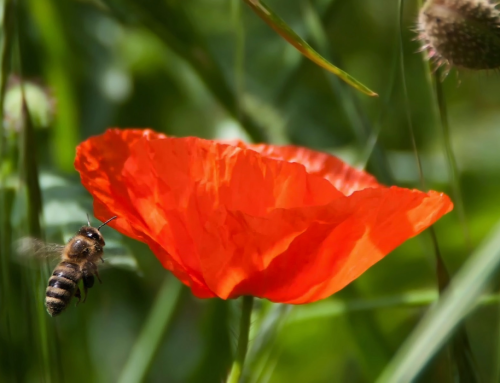In the increasingly complex landscape today’s pollinators must navigate, mounting pressures from food and habitat shortages continue to exact a sizeable toll on both domesticated honey bee and wild bee populations.
Fortunately, BC natural beekeepers like Kate and Ryan are doing their best to bolster bee numbers! Since 2017, the pollinator-loving pair has been propagating bee-friendly plants and foraging spaces at Elk Root Conservation Farm in the Slocan Valley. After carefully selecting and planting over 150 flower varieties (including many native plant species) and over 200 fruit and nut trees, they turned to the Bee BC Program to help them take the next step.
Thanks to project funding support, Elk Root is now home to a demonstration Bee Forage Orchard and Flower Meadow designed to enhance bee populations and health, while offering a model for fellow bee conservation enthusiasts.
According to Kate, the most recent challenge beekeeping in the Kootenays presents is seasonally limited natural nectar resources due to drier, hotter weather and extreme provincial wildfire conditions.
“This leaves insufficient means to naturally sustain our colonies, requiring us to supplement with nectar syrup substitutes,” Kate explains. “We have also been leaving the bees all the honey they produce from spring and summer foraging to ensure they have an adequate natural food supply over winter.”
But with an abundance of natural nectar sources now available in the newly established orchard, Kate is optimistic that increased honey store production is on the horizon.
“Thanks to Bee BC funding the orchard now includes thousands of additional nectar flowers blooming from early spring to late fall, many of which are not only edible but also boast medicinal benefits for bees like Echinacea and Chamomile,” she reports, adding that the unfenced land left open for roaming wildlife now offers a one-acre deer resistant wildflower and clover meadow as additional forage space.
While still in early stages, the results have been absolutely transformative – not only has Elk Root created a whole new ecosystem that attracts exponentially more honey bees, but Kate has observed a variety of wild pollinators also making the orchard and meadow “their personal forage oasis.”
And following their outreach and education efforts, Kate and Ryan are more than a little surprised to discover that Elk Root has evolved into a community hotline, fielding inquiries on all things bee-related!
When they’re not in the gardens or on the phone, the dynamic duo is facilitating the new not-for-profit Elk Root Conservation Farm Society to plan future tours. Kate hopes that by 2021 the new Society will be ready to open the demonstration orchard and apiary to public groups by appointment, once the gardens are more established.
“Ultimately, we hope to inspire others by creating a working model to demonstrate how our community can also select and plant beautiful nectar and pollen efficient gardens to optimize bee health and honey production,” says Kate.
To learn more about Elk Root’s conservation efforts visit: https://elkrootconservation.org/
